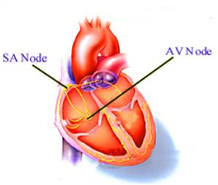Bradycardia is a general term for a heart rate that is slower than 60, in adults, beats per minute (the normal rate is about 60 to 100 beats).
A heart rate below 60 beats per minute may be normal for some people with healthy hearts. Most people's hearts slow down from time to time, such as when we sleep or are very relaxed. Also physically active individuals tend to have bradycardia while at rest.
Sometimes, however, a slow heartbeat is a sign of a problem affecting the heart's electrical system. If the rate is too slow, the heart may have trouble pumping the volume of blood the body needs. When the heart rate gets too low the blood flow to the brain can be insufficient. This can cause a person to feel lightheaded, dizzy or have loss of consciousness. (Or it may be the result of a diseased pacemaker)
The sinus node is a small area of tissue in the atrium (upper chamber) that generates the electrical signals that set the pace for the rhythm of the heart.
The medical term for the normal heartbeat is "sinus rhythm."
The Heart's Natural Pacemakers

The sinoatrial (SA) node (also called the sinus node) is the heart's master pacemaker. The SA node sends electrical signals in a steady, rhythmic pattern to pace the heart's beat. Signals from the SA node travel to:
The atrioventricular (AV) node, which transmits the signal from the upper chambers, or atria, to the lower chambers (ventricles). The ventricles are the major pumping chambers of the heart. The transmitted electrical signal triggers the powerful muscle contraction needed to pump blood into the lungs and throughout the body.
| Sinus bradycardia is a general term that describes a slow heartbeat related to the pace of electrical signals originating in the sinus node. It may be the sign of a well-conditioned, healthy heart that can pump the body's supply of blood with fewer beats than average. |
|
|
|
|
| An ECG of the heart's normal sinus rhythm |
|
|
| An ECG of a patient with a type of bradycardia called Heart Block |
|
|
|
|
| Sick Sinus Syndrome (also called sinus node dysfunction) is an abnormal heart rhythm (arrhythmia) related to the sinus node. It may be caused by disease or damage to the heart tissue itself, or by outside factors such as medications that affect the sinus node. |
|
Heart Block is a type of bradycardia related to the heart tissues that conduct the electrical signal from the SA node to the lower chambers, or ventricles. Heart block is often a problem with the (AV) node, a part of the heart's conduction system in the center of the heart. It also may be related to structures called the bundle of His and bundle branches, which conduct the electrical impulse so that it spreads like a wave through the ventricles, causing them to contract.
 |
|





